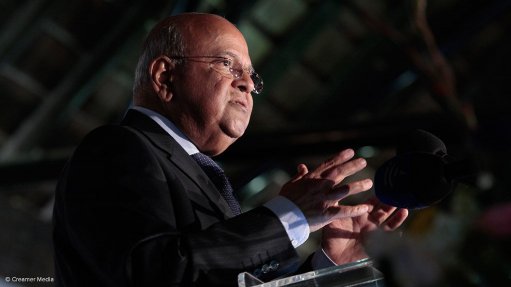
Finance Minister Pravin Gordhan
Photo by: Duane Daws
No single family should determine the fate of all South Africans, Finance Minister Pravin Gordhan said on Sunday.
Speaking at the African National Congress-organised “Opinion Makers’ Forum” at his former school, Sastri College in Greyville, Durban, he said there was a “desperation in modern politics that made people want to discredit people who tried to do what was right”.
In an apparent reference to the politically-connected Gupta family, Gordhan said: “No single family must determine the fate of 55-million South Africans. This is a phenomenon called cronyism. It is not unique to South Africa but we need a South African formula to fix it.
“We can’t sacrifice democracy because a few people think they can own our lives. When people threaten lives [like that of Deputy Finance Minister Mcebisi Jonas if they speak out], all 55-million people must stand up and ask those people ‘what do you have to hide?’. The masses are wiser, cleverer, and more perceptive than we think,” he said.
In a wide-ranging address to a capacity house, Gordhan said when the country was facing the challenges it did at the moment, “one needs to recall [the past] in order to inspire one to do the right things, to stand up for the right things, and to find that little bit of extra energy which will revive the spirit of that time”.
He said although there had been “depressing stories in the recent public space”, his overseas roadshow with South African business and labour leaders and National Treasury officials to meet 265 investors in London, New York, and Boston had been both positive and challenging.
“Among [the investors], the companies controlled eight trillion [US] dollars that they can invest in our debt [bonds] and in our equity [shares].”
Despite the difficult questions he had to handle on the roadshow, there were many good things to say about the country. “On the World Economic Forum’s competitive index South Africa ranked between one and five in the world in a number of key business areas such as auditing, corporate governance, the financial sector, and governing of the stock exchange.
“Although there are some private individuals who think they can lay their hands on Treasury, it has been, over the last six, seven, or eight years, number one, two, or three among [about] 90 countries in budget transparency in the globe.”
In the past 20 years, South Africa had done “remarkably well” in the human settlements department, given the level of access to housing, water, and electricity. “There are not many countries that can say they have done as well. We cannot deny that delivery has taken place in South Africa,” he said.
He also conceded that in “my other job” (co-operative governance minister) he saw good things but also some “terrible things” when visiting municipalities. “… corruption, tenders going wrong… delivery was not happening the way it should have to benefit the poor.”
Economic transformation was difficult, as the economy had to transform from one that gave no role to blacks to one that had a 50 percent role for blacks. This would not be short-term task and he had to remind himself to have “revolutionary patience”, a term activist and former politician Ben Turok used to use.
“We need to be proud of what we have delivered, look boldly at the challenges, and find a way to fix them,” he said, but also remember that some things would take longer than others to get going on the ground.
“We need a new generation of cadres and activists who become involved and make a contribution. As public representatives, we must be bold about what we do well and about what we do badly.”
Gordhan again reiterated the need to go back to basics in the ruling party, as found in the ANC constitution, with unity being paramount, as was the building of a non-racial, non-sexist society.
He said “social justice” was also a back-to-basics tenet that had to be practised. “We promote social justice not for oneself and one’s pocket, but for the millions of underprivileged who live on the margins. Real social justice empowers South Africans to grow out of the socio-economic place they find themselves in.”
South Africa had done “brilliantly” in the first 20 years of democracy, but now the graph was flattening and would stay that way if the economy did not grow.
“There are still too many people sitting on the margins. Are we doing things that ensure the masses can become key economic contributors? We have the money to bridge the gap. We just have to spend it the right way and stop the leakage factor,” he said.
– African News Agency (ANA)